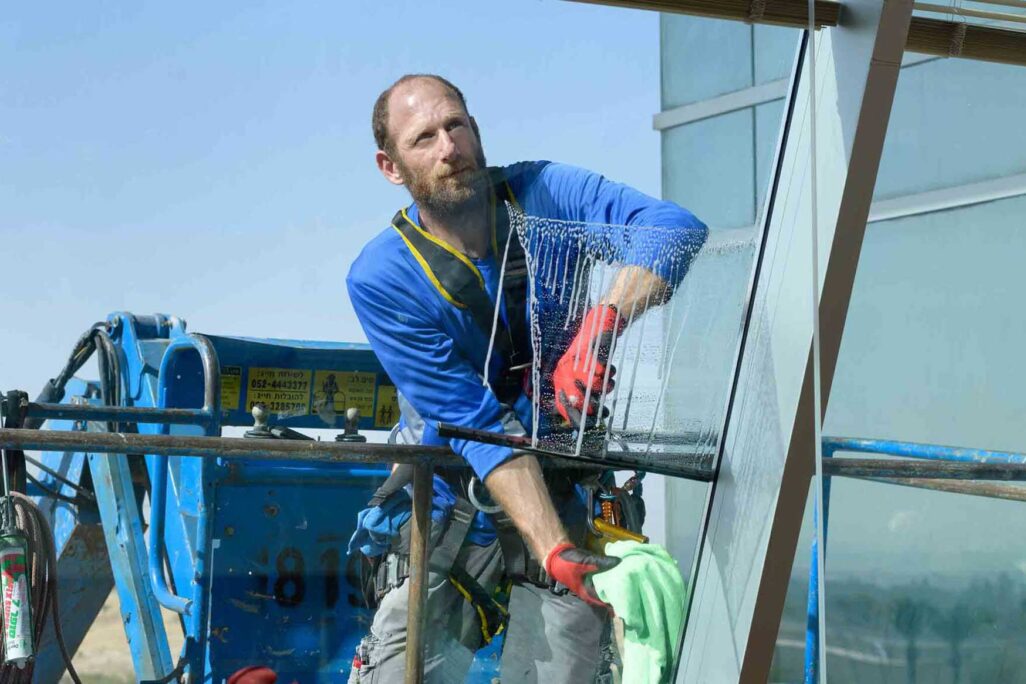
May 1st marks the International Day of Workers, commonly known as May Day. This May Day, six Israeli workers from a wide array of backgrounds and professions, speak about their day-to-day experiences. All of them express a passion for their jobs.
Yekaterina Sokolov (26), electrician at Israel Aerospace Industries, from Rishon LeZion
"I came to this job right after the army and I have been working here for over five years, converting carrier planes to cargo planes.
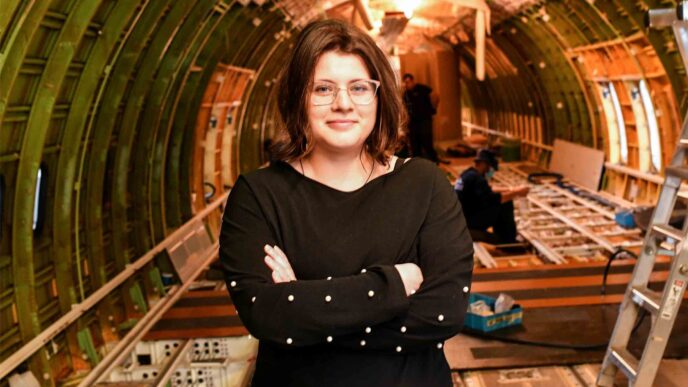
"I came to this job right after the army and I have been working here for over five years, converting carrier planes to cargo planes.
“I work with another 100 employees on an assembly line, converting Boeing 767 passenger planes into cargo planes for the world's largest shipping companies, such as Amazon, FedEx and DHL.
"I make sure that all the electrical systems in the passenger plane will fit on the cargo plane, basically re-electrifying the plane’s electrical system. It is a physical job that requires meticulousness, attention down to the smallest details. The electrical system changes completely between the two types of planes in the process.
"For five years, I was almost the only female worker here and now there is another worker. They are trying to recruit more women but it's not easy.
“I like everything about my job.The process of dismantling, transfers, installations. I have been the head of a department for the past six months and I became more responsible for the employees. I like that people are happy with me and I like to help everyone who needs it and asks for help, it gives me a good feeling."
Erez Alon (43), window cleaner, from Petach Tikvah
"I've been in the high-rise window cleaning business since '99, for 22 years. You could say I got there by mistake. After the army, I worked at a friend's power washing company.
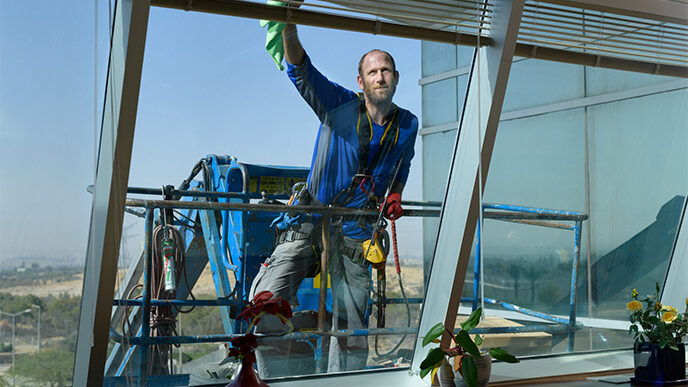
There, among other things, I would work on a platform at heights of 20-30 meters, and I had no choice but to get used to the height. From there, I went on to working while rappelling, doing high-rise cleaning and repairs.
"When cleaning while rappelling, it is important to get up and arrive early in the morning, to avoid the sun. This is especially true in the summer, because it can be difficult and dangerous to work in the sun that is reflected from the window. The work is seasonal, there is no cleaning in the winter.
“I work mainly on industrial buildings, using a clean water method, which means that there is a system that sterilizes the water. The hoses spray distilled water, which helps the water to evaporate without leaving a mark on the windows.
“It's exhausting, but I love my job, mostly because I’ve been at it for many years and I know what I’m doing. At first it's scary, but when you know what you're doing, it can even be fun. And sometimes it's funny, people get startled a lot, they are sitting in their office and suddenly someone appears in their window.
“With proper and safe work practices, there is a very small chance of having accidents. Driving is more dangerous than rappelling. On the road, you depend on the driving of others, while during rappelling, you depend only on yourself."
Ahmad Hussein (52), cleaning worker and deputy custodial administrator, from Fureidis
“I started working at the age of 14 at Carmel Hospital [in Haifa], as a kitchen worker employed through a contractor. At the age of forty-nine, I applied to work directly for Clalit (one of Israel’s largest health service organizations), but was not accepted because I already had two employed brothers [working there], so I applied for a transfer and came to Meir Hospital.
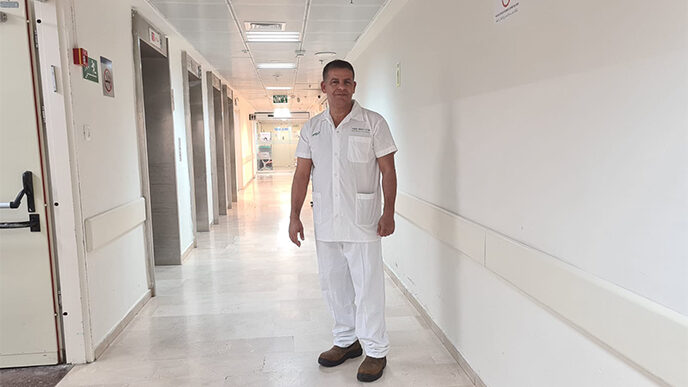
“Cleaning a hospital wing is a very systematic matter. First you do a sweep and clean up the mess from the night before. Then, you clean the hallway and the nurses’ station and do an initial clean of the rooms – the trash, the sink, the toilet. Only later on do you wash everything down.”
“The hospital invested in me and provided funding for me to study administration management and I am now a deputy custodial administrator. I am an administrator who is very much on the ground, cleaning with everyone all day. I took responsibility for setting up the coronavirus wards and instructed everyone on how to protect themselves while cleaning the wards. During the hardest parts of the pandemic, a lot of workers were afraid to go into the corona wards of the hospital [to clean], but I was the first one in to clean.”
“My day starts at six in the morning but I arrive earlier. I sweep the entire hospital and check to see if anything happened in the wards overnight, and I record any problems that arose.
"I love my job. When I arrive for work, I’m coming in to do the best job I can. When I do a good job, it calms me down. I do everything from the heart, and I clean as if I was cleaning my own home.”
Osher Mesika (18), technician’s apprentice at Tel Nof Air Force Base, from Modi'in
“I work as a part of my studies at the vocational school at Tel Nof Air Force Base. I work closely with a qualified technician once a week, from morning to evening. Our area of focus is on the plane parts. I work with the most professional people in the field, an opportunity I would never have had in a ‘regular’ job. I meet with pilots, senior officers and engineers that I can just approach and talk to. It's knowledge, it's experience and it's just fun."
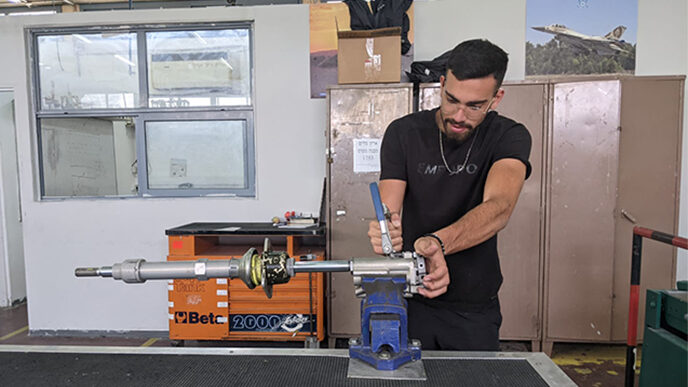
“It’s a bummer for me that I only work one day a week, because I would like to work more. The challenge is combining work and school. It is not easy, there is pressure from both directions, but that's what makes this track so successful. It takes me from academics straight to the real world.
“I arrived at Tel Nof in the ninth grade and I will continue to my army service in the air force. When I got here, I already knew that this was what I wanted to do. Now, I have prospects for the future: I will enlist in the Air Force, which will open doors for me. At the beginning of the year, I received a certificate of excellence from a colonel. At the certificate ceremony, I was incredibly excited.”
Yamit Guetta (41), Pri Galil factory worker, from Hatzor HaGlilit
“I start my day at 6:00 AM, and finish at 6:00 PM. It’s a busy, interesting and challenging day – all in all, it's fun."

"I started working in a factory in 1997, when I was 18 years old. I went to the employment bureau and they referred me to Pri Galil. I was in production for 12 years, and then I moved to clerical work. I still remember my first day – I had no idea where I was going, it was like being thrown into the deep end.
“There was a time when I worked peeling grapefruits – we would sell them peeled. People would see my fingers and ask if I worked in a factory. I now deal with orders, inventory, reports and shipments. I sometimes also go out into the field, to do checks on trucks, goods being returned, incoming shipments and certifications.
“A significant moment I remember was during 2009, when the factory was in negotiations to be bought off. There was tension over who would buy us, there was talk of layoffs. There was no certainty that we would continue to exist and no one knew what would happen next. I was still young. But there were older people working there, and in terms of employment, they had nowhere else to go. To suddenly see the police closing the factory gates – it was like being in a movie.
“Now things are more stable. The factory is functioning, thank God. There are good conditions. Salaries arrive on time. There are holiday gifts and convalescent care for when we are sick. Overall, it is a good factory for an area [of the country] without much employment. I'm in the union, and we've not managed to do much this year, what with COVID-19. Now, we’re returning to normal.”
Amir Radwan (24), baker, manager and cashier at a café and bakery in Jerusalem, from Beit Safafa
“I have been working here for three months, replacing my father, who worked here for 20 years and passed away a few months ago. It's hard to replace my father. If I could accomplish even half of what he managed, it would be good enough for me.
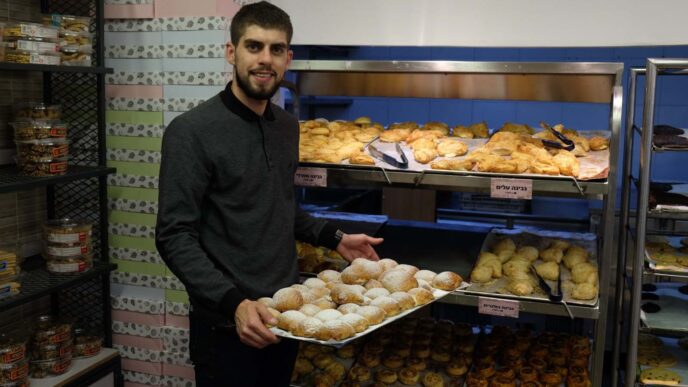
“The thing I love most is coming to this place to work; doing the work itself. I love the smells of the sugar and yeast rising in the ovens. I am here every morning, seven days a week, from 5:30 AM until evening when we close. I only take time off when I have to, it's not something I do regularly. If I don't need time off, then why not just go to work?
“The stressful moments [at the bakery] annoy me, but they pass. Personally, my favorite day to work is Friday, where there are lots of customers and lots of workers.
“I need at least another year of work to understand what success means. Every day I learn something new, and if not at work, then in life; and when I learn something new in life, I see how it [applies] to me at work. I see myself doing this for another 20, even 30 years. Of all the dozens of pastries here, I like the coffee the most.”






